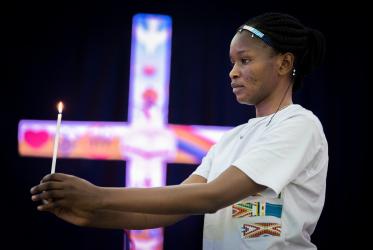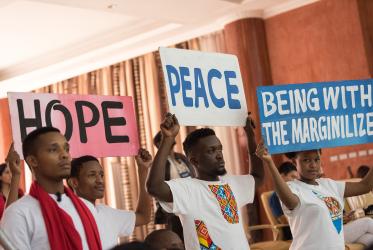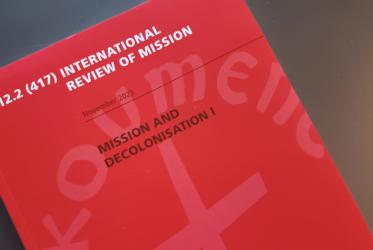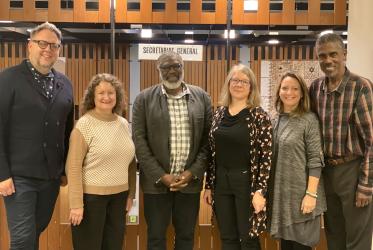The Protestant Church in the Netherlands faces a challenge to be the church "in an authentic way,” says Dr Arjan Plaisier, secretary of the general synod of the Protestant Church in the Netherlands.
“In the Netherlands we come from a big period when we knew it was all okay and we could give ready answers,” he said. “Now, we don't really have words to express why we continue being a church. We face uncertainty about our fate.”
In the policy paper “Church 2025 - Where there’s a Word, there’s a way,” he outlines his vision for the Protestant Church in the Netherlands. The paper asks a key question for Plaisier: “Isn’t it time to go back to basics?”
Plaisier refers to Mark 6:7-9, in which Jesus sends his disciples out, instructing them not to take anything unnecessary with them - just a pair of sandals for the journey.
“Nowadays, Jesus’ words ‘just sandals for the journey’ take on a new relevance,” he writes. “As a Protestant church, we have become heavily laden. Along the way, we have acquired and achieved things that have influenced our way of following Jesus’ path, and on that path we have experienced much of God’s goodness.
“At the same time, we feel that the journey has become more and more difficult. It’s as if we have become trapped in our own church culture. Many see us as a governing church. How can we step forward onto the lighter path on which Jesus once sent his disciples?”
Talking about his paper, Plaisier passionately asks “Can we look at the start of Christianity? Can we go back to the vibrant beginning of faith? Then, on the basis of what we see, what do we want to continue and what do we want to let loose?”
Plaisier believes it is our responsibility to be “sent by Jesus,” and urges us to think about the disciples. “They went without burden,” he points out, “only their sandals: a lighter step, a lighter walk. This brings enthusiasm and energy.”
Listening to church and society
Since September 2014, the Protestant Church in the Netherlands has focused on the future, encouraging discussions with scientists, trend-watchers, ministers, church council members, synods, young people, and others.
In February 2015, the Protestant Church publicly surveyed church members, asking their opinions on the future. Around 18,000 people participated.
“I have to give the credit to the communications part of our organization which did great work and mobilized people to respond,” Plaisier said. “Most people are very enthusiastic that their opinion was asked. Everybody had an opportunity to think and speak about it in a fruitful way.”
Plaisier acknowledges his questions are difficult, with no easy answers. But inaction is not an option, he added. “We face a shrinking of church membership but let’s not sit in the corner and be pessimistic,” he said.
Plaisier is grateful to ask these questions in an ecumenical context. “I am sure the challenges we face are similar to those other churches face,” he said. “We think this report can help others get ideas.”
Acting as a unified church is also a way of “getting back to basics,” he notes. “Don't do things by yourself. We are a church together. We need each other.”
“Church 2025” begins with the question: why church? Plaisier encourages people to explore the essence of church identity.
“The church seems a distant and strange institution for many of our contemporaries, so now is an especially good time to rediscover what lies at the heart of the church and get back to basics,” he writes. “It is an exercise in seeing the forest again through the trees, in finding joy in this ourselves and being able to radiate this joy to others.”
The paper briefly analyzes culture and its impact on the church. It follows with questions about the church’s focus.
“What should we let go of, and what should we be certain to do? What is needed right now? Where do we need coaching and equipping…to be a relevant church, both for ourselves and others?”
Plaisier also looks at structural changes the church can make. “Associated keywords include transparency, space and simplicity,” he said.
“Of course, as a church, we shouldn’t occupy ourselves solely with our own organization, but there are times when that does need to happen,” he writes. “A good organization is helpful. When the organization has become too restrictive or too heavily based on a cultural framework or church culture that is eroding as people and resources ebb away, it’s time to move the markers.”
Church 2025 can be seen as a part of the pilgrimage of justice and peace, said Rev. Karin van den Broeke, moderator of the general synod of the Protestant Church in the Netherlands and a member of the World Council of Churches (WCC) Central Committee.
“Living in a world of many religions and world views, the Protestant Church in the Netherlands is challenged to rethink the position of Christianity,” she said. “We consider this challenge as an opportunity to rediscover the meaning and the gift of being church. The WCC mission statement Together Towards Life speaks about mission from the margins. People on the margins have agency, and can often see what, from the centre, is out of view.”
We enjoy the contribution of the Gospel as a life-giving, liberating and encouraging message, she added. “Church 2025 calls the Protestant Church in the Netherlands back to basics. On our pilgrimage of justice and peace we celebrate church life and we encourage our church members to welcome the Holy Spirit, to read the Bible and to take care of fellow human beings and creation.”
The church’s sure future
Plaisier said he hopes that the Protestant Church in the Netherlands can manage, within a year or two, to make organizational changes. “I’m really convinced we need it.”
Having hope for a church of the future connects people in a constructive way, said Plaisier.
Part of a return to basics involves rediscovering the simple joy of church, Plaisier writes in Church 2025.
“Anyone reading the New Testament can’t help but notice the joy that emanates from the text whenever the church is mentioned. Think of the glorious images of ‘the bride’ and ‘the body of Christ’, images that illustrate…the church is a gift from God Himself rather than a product of laborious human effort.”
He adds, “Talking about the church almost automatically brings up other words and images, such as decline and obsolescence, and the image of an ancient building coated in a thick layer of dust. The church that once formed an important part of our culture and society now seems unnecessary. In such times, the temptation to give up on the church is therefore very recognizable.”
But Plaisier believes life will always include the church: “The church was not a human project, but a gift from God,” he writes. “It is a gift that resists erosion and damage, tarnish and rust. Even if the church is covered in a layer of dust, the life beneath will never be…smothered. God Himself will keep it alive by His secret ways.”






